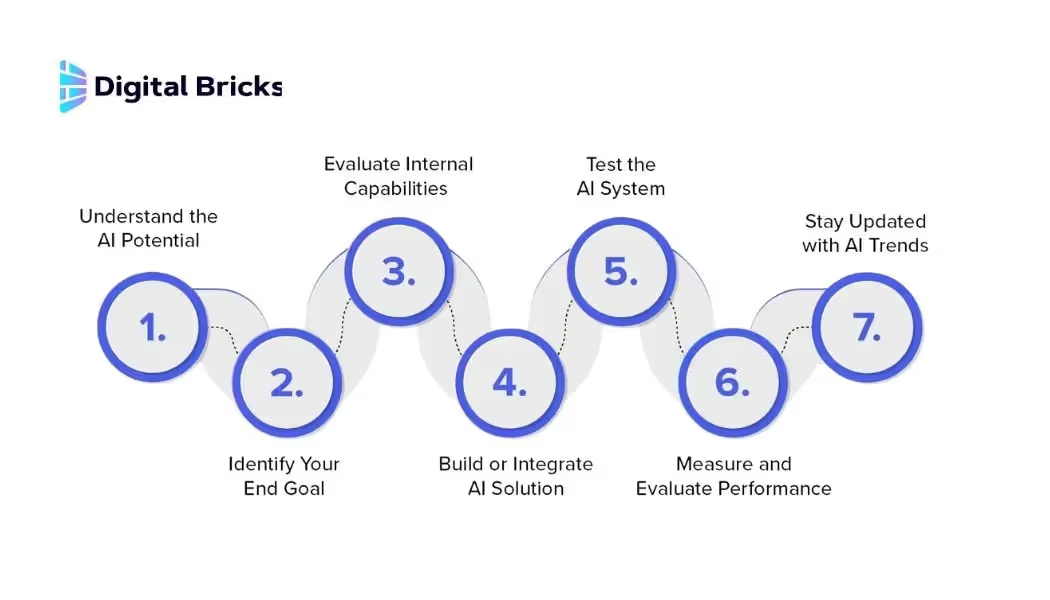
What's the Right Way to Approach Your AI Strategy?





Nowadays, if somebody boasts about using a computer to do banking, pay bills, and shop for their new t-shirt, you’re not surprised. But rewind a little, and there was a time when this wasn’t the case. Just like that past paradigm shift, our time is experiencing another: artificial intelligence. It's coming, whether it’s in 3 years, 5 years, or 10 years, the shift towards using AI for various applications will become the norm. It will be integrated into every industry across finance to manufacturing. The pressing question for most organisations is: "How do I get started?"
With any organisational pivot, preparation is crucial. "Fail to prepare and prepare to fail," as Benjamin Franklin famously said, rings true for the strategic approach organisations should adopt with artificial intelligence. However, diving into AI can seem daunting due to its complexity and the significant changes it can bring to traditional business processes. The key is to approach AI strategically and methodically.
So, how can your organisation effectively start its AI journey? Here’s a step-by-step guide to help you navigate the process:
Rather than asking, "How do we bring AI in?" start by asking, "What are our problems? What is this strategy going to solve for our business?"
Looking deeply into one's imperfections can sometimes be a challenging stare-in-the-mirror moment, but in this case, it's essential. Dig deep to understand the gaps. You may be a retail company facing inconsistencies with returning customers, indicating a need to improve brand loyalty. Maybe internally, there is a disparity in organisational knowledge that needs addressing. Building a stronger company culture, or strengthening the balance sheet—there are many questions to ask and areas to explore.
To effectively leverage AI, it’s crucial to understand its capabilities and how they align with your business needs. AI can enhance data analysis, automate routine tasks, improve customer experiences, and predict trends. By recognising these potentials, you can envision how AI might solve the problems identified in the previous step. For example, AI-driven analytics can provide deeper insights into customer behavior, helping to tailor marketing strategies and improve customer retention. Embrace a mindset of continuous learning and curiosity about AI advancements to stay ahead of the curve.
Having a clear vision of what you want to achieve with AI is vital. Are you looking to streamline operations, enhance customer service, or innovate new products? Define your objectives clearly and ensure they are aligned with your overall business strategy. This goal-setting phase should be specific, measurable, attainable, relevant, and time-bound (SMART). By establishing clear end goals, you can create a focused AI strategy that targets specific outcomes, making the implementation process more straightforward and the results more impactful.
Assessing your internal capabilities is a critical step. This involves evaluating your current technology infrastructure, the skill levels of your employees, and your organisational readiness for change. Implementing AI requires a mix of technical skills, domain knowledge, and a willingness to adapt. Upskilling initiatives are essential—consider training programs to enhance your team’s understanding of AI technologies. Designating AI champions within your organisation can help drive the adoption process and create a culture of innovation. These champions can lead by example, fostering an environment that embraces AI and encourages continuous learning and development.
Once you have assessed these factors, you can evaluate your strategy, draw conclusions from your findings, and begin the implementation project. This project will include building or integrating existing AI solutions, testing, measuring, evaluating, and continuously improving.
If you are interested in getting started with your organization's AI strategy, including upskilling and implementation partnerships, contact Digital Bricks today. Our unified delivery methodology and template approach ensure consistent implementations, resulting in cost-effective solutions with predictable outcomes.
